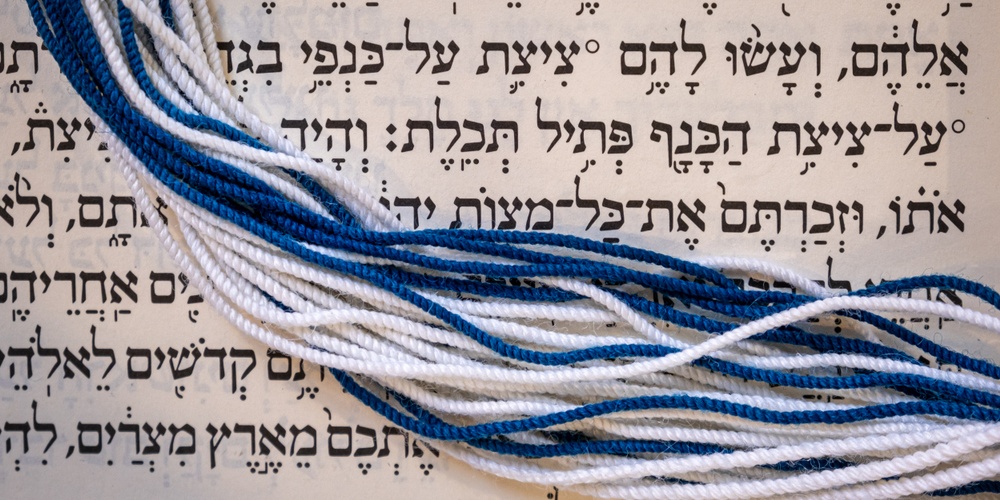
Parshat Shelach Lecha details a most familiar story. The tragic events surrounding the mission of the meraglim forced Bnei Yisrael to endure a long and arduous journey in the desert. Many commentaries point out that even today, we still suffer from the effects of that rejection of the land, similar to the way that the effects of sinat chinam from the days of the second Temple are still with us.
Yet it is not only the story of the meraglim for which the parsha is known. The concluding paragraph of the parsha details the mitzvah of tzizit. The importance of this mitzvah is evidenced by the fact that our Sages choose it as the third paragraph of the shema, making its twice-daily recitation mandatory. Interestingly, Shelach Lecha begins with the narrative of the failed attempt to settle Israel, but ends with the reminder that "I am the Lord, who brought you out of Egypt to be your G-d, I am G-d your Lord" (15:41). Despite our failure to arrive at our destination, the Torah is telling us, our relationship with G-d is predicated first and foremost on our redemption from Egypt. While the situation is not ideal, we can survive without Israel; we’ve done it before. But we cannot survive without the memory and lessons learned from our Egyptian experience.
If Israel and tzizit form the bookends of the parsha, surely this is no coincidence. On the surface, there appears to be little connection between the mitzvah to live in Israel and the mitzvah of tzizit, a mitzvah that is applicable wherever Jews may live. Yet our Sages greatly extol and equate the virtues of these two mitzvoth, equating their observance to that of all other mitzvoth in the Torah. Why are these mitzvoth deemed so crucial?
Clearly, loving our neighbour is more important than the neighbourhood in which we live, be that in Israel or elsewhere. Even more difficult to fathom is the importance attached to tzizit. In fact, there is not even an obligation to wear tzizit. Only if one happens to be wearing a four-cornered garment is one required to attach the tzizit.
It would appear that both tzizit and Israel are important not so much intrinsically, but for their role as "enablers" in developing both our personal and national character. The Torah describes tzizit as having the ability to trigger spiritual awareness; "when you see them, you shall remember all of G-d's commandments so as to keep them". (15:39) The Torah continues, adding that tzitzit has the power to prevent us from "stray(ing) after your heart and eyes." (15:39) Our Sages tell us that the blue techelet in the tzizit reminds us of the sea, which reminds us of the blue sky, which reminds us of the "seat of glory" of G-d. As Rav Samson Raphael Hirsch notes the word tzizit derives from tzizt, to sprout. Tzizit are the trigger to reach for G-d, and a constant reminder of His presence in the long and multi-staged process of coming closer to Him. However, no one can force a person to yearn for G-d. While the Torah can command our actions, the desire for G-d must come from within.
What is true about tzizit on the personal level is true about Israel on the national level. Moshe's burning desire to enter the land, the Talmud explains (Sotah 14a), was not so he could necessarily live in a particular place, but rather so he could perform additional mitzvoth that could not be performed outside the land. It is the land of Israel, and only the land of Israel, that gives us the opportunity to fulfill our national mission to be "a kingdom of priests and a holy nation." (Shemot 19:6) Only in our own country can our economy, our judiciary, or our social service network run according to Torah laws, sanctifying the name of G-d as we carry out the mandate given to Abraham to promote righteousness and justice.
While the potential is great, so are the dangers. Aiming straight for the "seat of glory" can have tragic consequences. We must get there via the “sea” and the “sky”. We must scale the heights of religiosity step by step. If we rise too fast, we are sure to fall.
So too running our own country without the moral directives of Torah is fraught with peril for all. Thus, G-d delayed our entry into the land for forty years, developing a generation better prepared for the hardships of conquering the land. While the eating of matzah or the observance of Shabbat demand our participation whether we are ready or not, living in Israel is different. Interestingly, the Rambam does not even count living in Israel as a mitzvah, though it is clear he believes it is exceedingly important (see laws of Kings 9:12). Living there is only meaningful in the context of strengthening our commitment to Torah.[1]
Israel and tzizit are the catalysts to inspire us to observe Torah in its totality. Without such inspiration, they are nothing more than a place to live and clothes to wear. The modern-day state of Israel, despite its many secular values, has been the catalyst for an increase in Torah observance the likes of which have not been seen since the days of Chizkiyahu HaMelech, during the time of the first Temple. Torah observance is everywhere, including amongst those who claim to be non-observant. Millions of Jews who might have assimilated into the dominant culture living elsewhere in the world cannot vanish living in a Jewish state. We have waited almost 2,000 years for a chance to create a Jewish state in our ancestral homeland.
Providentially, but probably not coincidentally, we have also recently re-discovered the long missing techelet, enabling us to fully observe the mitzvah of tzizit. May we be worthy to properly observe these mitzvoth as we develop ourselves both personally and nationally. Shabbat Shalom!
_______________________
[1] Interestingly Rav Moshe Feinstein (Even Haezer 1:102) specifically compares the mitzvah of tzizit to that of living in Israel claiming that just as there is no obligation to wear a four cornered garment and hence no obligation to wear tzizit so too there is no obligation to live in Israel. Of course one who does so is fulfilling a great mitzvah but unlike say matza there is no actual obligation to ensure that one observe these two mitzvoth.



